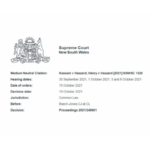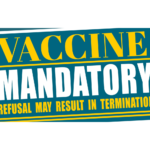Paramedic Loses Challenge to COVID-19 Vaccine Mandates

New South Wales paramedic John Larter has lost his challenge to COVID-19 vaccination mandates, and could now also lose his job.
The New South Wales Supreme Court dismissed Mr Larter’s challenge to provisions in the state’s current public health order which prohibit healthcare workers from continuing in their employment if they are not fully vaccinated or have a medical exemption by 30 November 2021.
Conscientious objection
Mr Larter’s lawyers submitted in court that their client found the COVID-19 vaccines “morally repugnant” due to his Roman Catholic faith, his morality and his conservative political views.
His lawyers also argued that the court should invalidate the mandates because it is unreasonable for unvaccinated workers to be terminated over a “temporary pandemic”.
Case dismissed
However, Justice Christine Adamson dismissed the case, ruling that the ambit of the order was reasonable based on reasons given by NSW Chief Health Officer Kerry Chant, including advice that the virus is high risk and easily transmitted.
Justice Adamson also accepted Ms Chant’s assertion that NSW Health operated an integrated system, and full vaccine coverage was optimal because of its effectiveness in minimising risk.
While the likelihood of an unvaccinated healthcare worker catching and passing the virus might be regarded as relatively remote, the harm – such as deaths and operational disruption to hospitals – also needed to be considered, Justice Adamson found.
Her Honour also rejected Mr Larter’s bid for an exemption on religious grounds, finding a person’s belief system irrelevant to the determination of an exemption grant.
Some healthcare workers remain unvaccinated
About 2.7 percent of NSW Health workers remain unvaccinated, and many of them have been keenly awaiting the outcome of Mr Larter’s challenge.
Some will opt not to have the vaccination and will need to reassess their future.
Future unclear
Mr Larter’s future remains uncertain.
He was suspended at the time of launching the legal challenge, and is understood to be on leave. He has been a paramedic for 25 years.
It’s certainly another blow to workers facing the very real threat of ‘no jab, no job’.
No protection without constitutional protections or a bill or charter of human rights
However, as was noted after the first case of this kind, Kassam v Hazzard; Henry v Hazzard which consisted of a group of ten people (including teachers and nurses and other Sydney residents required to be vaccinated for work) whose bid to overturn vaccination mandates on the grounds grounds of – amongst other things – protecting bodily integrity, and that the state had exceeded its power by making order, also failed, without a charter of rights, neither legal bid had a high chance of success from the outset.
In a previous interview with Sydney Criminal Lawyers, Constitutional Law Professor George Williams pointed out that one of the main impediments to the success of these legal challenges is the broad powers enshrined in the NSW Public Health Act 2010.
The eminent constitutional law expert explains that without constitutional protections or a national bill or charter of rights, challenges against COVID-19 based restrictions are unlikely to succeed in Australia.
Misinformation is unhelpful and shifts away the focus
Many believe misinformation being spread on the internet is harming efforts towards real change in Australia.
This misinformation is widespread, relating to such matters as:
- The constitutional protections we have in Australia (which are extremely limited),
- What the Public Health Act says (some even claiming Public Health Orders require personal service, when this service requirement relates to orders on specific persons under Part 4 of the Act, not general orders under Part 2),
- That the Nuremberg Code applies to vaccine mandates (a Code which is a guideline, has never been enacted in Australian law and which relates to medical experiments and not provisionally approved drugs), and
- That British laws which pre-dates Australian ‘settlement’ somehow applies our nation (which shows a lack of understanding of how the legal system operates).
Sadly, the proliferation and focus on this misinformation shifts the focus away from pushing for constitutional change and/or a national bill or charter of rights, and these legal challenges (all of which have failed) not only waste enormous resources, but can give people false hope.
What does the Public Health Act say?
Section 7 of the Public Health Act provides as follows:
Broad powers under the Public Health Act
(1) This section applies if the Minister considers on reasonable grounds that a situation has arisen that is, or is likely to be, a risk to public health.
(2) In those circumstances, the Minister—
(a) may take such action, and
(b) may by order give such directions,
as the Minister considers necessary to deal with the risk and its possible consequences.
(3) Without limiting subsection (2), an order may declare any part of the State to be a public health risk area and, in that event, may contain such directions as the Minister considers necessary:
(a) to reduce or remove any risk to public health in the area, and
(b) to segregate or isolate inhabitants of the area, and
(c) to prevent, or conditionally permit, access to the area.
(4) An order must be published in the Gazette as soon as practicable after it is made, but failure to do so does not invalidate the order.
Vaccination targets
The vaccination target in New South Wales is now above 90% double-vaccinated, people aged 16 and over, and the vaccination rates in other states are steadily climbing, but the State Governments are continue to push vaccination mandates, with an emphasis now on vaccinating school children and rolling out booster shots for anyone who had the COVID-19 vaccination 6 months ago or longer.
There is a challenge to Victorian vaccination mandates gathering momentum, which has yet to make its way to the courts. Several Queensland Police have also mounted a challenge in Queensland against a rule which prevents them from working without being double-vaccinated. It is also yet to make its way through the courts.
Queensland is yet to introduce harsh vaccination mandates to the extent that New South Wales and Victoria have, although this week announced that it would be requiring all people working ‘in any health facility’ across the state to be vaccinated.






